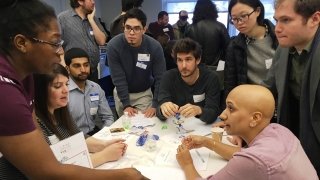Blythedale to Participate in TOM:NYC Makeathon

For children with complex medical needs, highly customized assistive devices typically prove to be costly and often difficult to come by. Enter TOM:NYC and a three-day Makeathon, in which teams of eight “makers” (engineers, product designers, developers and coders) will collaborate with “need knowers” (which in Blythedale’s case includes specially pediatric-trained physical, occupational and speech therapists) to create prototype solutions for children and adults with limiting disabilities.
More than 180 participants will gather on April 21-23 at New Lab at the Brooklyn Navy Yard for TOM:NYC, to develop affordable, assistive technology to address the unique needs of children and adults with disabilities. By challenging teams to create extremely affordable solutions using the most cost-effective materials, access and scope stand as core visions of TOM Makeathons. Completed designs will be published online for public domain use, increasing accessibility for those with similar disabilities.
“Participation in this event is an extraordinary opportunity for Blythedale,” said Chief Administrative Officer Maureen Desimone, who oversees the Hospital’s Assistive Technology program. “We are so grateful to collaborate with these extremely gifted volunteers in order to develop solutions that will not only benefit our patients, but children with special needs on a much broader scale. It’s deeply inspiring to witness their creativity and commitment firsthand.”
Blythedale Children’s Hospital submitted three challenges for consideration, all of which were selected by TOM experts. The team will develop creative and cost-effective solutions in the following areas:
Switch Toys for Children: The switch toys on the market today are limited in variety, generally are expensive, and are often not durable. Many are not sufficiently stimulating for children with special needs who crave a normalized environment that will allow them to use the same popular toys that other children have. The Makers are challenged to create a safe wireless interface between the child’s switch and the toy of choice.
Ring Splints (software): Children with disabilities often have fingers with atypical posturing--a child’s finger joints, for example, may appear to bend backward. When fingers are held in better alignment, children have better use of their hands. Ring splints are small, plastic orthotics that hold fingers to improve alignment. They are available commercially but stock sizes do not fit children appropriately and the custom silver splints are overly expensive. The challenge is to develop ring splints in custom sizes, colors and shapes for all children with disabilities, and to develop an application for therapists that will generate a 3D file of a pre-designed splint based on a patient’s measurements.
Customizable support chair: Many children with disabilities do not have the motor control to independently sit upright. When provided with a chair with sufficient support, they are able to use their eyes and hands for learning and play. The challenge is to create a customizable pre-school chair providing optimal postural support for a disabled child.
“Blythedale Children’s Hospital’s participation in TOM:NYC has created an exciting convergence,” said TOM:NYC organizer, Oded Shorer. “As a leader in specialty pediatric care, Blythedale is the first hospital in the U.S. to provide assistive tech challenges to a TOM Makeathon and has also volunteered a diverse team of specialists to collaborate with local Makers. Not only will the prototypes designed be available to the hospital’s patient community, but it means that children with similar disabilities globally can also benefit.”

